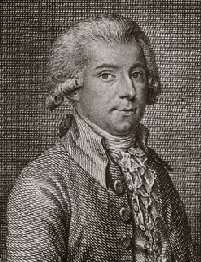Il burbero di buon cuore
| Il burbero di buon cuore | |
|---|---|
| Opera by Vicente Martín y Soler | |
 Vicente Martín y Soler | |
| Librettist | Lorenzo Da Ponte |
| Premiere |
4 January 1786 Burgtheater, Vienna |
Il burbero di buon cuore (The Good-Hearted Curmudgeon) is an opera dramma giocoso in two acts by Vicente Martín y Soler. The Italian libretto by Lorenzo da Ponte is based on the French comedy Le bourru bienfaisant by Carlo Goldoni. The opera premiered on January 4, 1786 in Vienna at the Burgtheater with a cast that included three well known Viennese singers of the day: Nancy Storace as Angelica, Francesco Benucci as Ferramondo, and Maria Mandini as Marina.[1] The opera premiered in the same year and at the same house as Mozart's Le nozze di Figaro, and both operas enjoyed revivals at the Burgtheater three years later — each boasting two new arias for new leading ladies. The new arias for Il burbero di buon cuore ("Chi sa, chi sa, qual sia" K. 582 in Act I and "Vado, ma dove?" K. 583 in Act II, both for Lucilla[2]) were actually composed by Mozart, as Martín y Soler had left Vienna to work at the court of Catherine the Great in St. Petersburg. The opera recently received its first modern revival in 2007 at the Teatro Real in Madrid, a performance which was videotaped live and released on DVD in 2009.[3]
Roles
| Role | Voice type | Premiere Cast |
|---|---|---|
| Angelica | soprano | Nancy Storace |
| Castagna | baritone | |
| Cavalier Giocondo | tenor | |
| Madama Lucilla | soprano | Maria Piccinelli-Mandini |
| Marina | contralto | Maria Mandini |
| Dorval | bass | |
| Ferramondo | bass | Francesco Benucci |
| Valerio | tenor | |
References
- ↑ Il burbero di buon cuore at mundoclasico.com
- ↑ "Back in the Spotlight: Martin y Soler's 'The Kind-Hearted Grouch'". World of Opera. Retrieved July 27, 2014.
- ↑ Matthew Gurewitsch (July 2009). "VIDEO: MARTÍN Y SOLER: IL BURBERO DI BUON CUORE". Opera News. 74 (1). Retrieved June 26, 2009.
- Casaglia, Gherardo (2005).[http://almanac-gherardo-casaglia.com/index.php?Testo=Il_burbero_di_buon_cuore&Parola=Stringa "Il burbero di buon cuore"]. L'Almanacco di Gherardo Casaglia (in Italian).